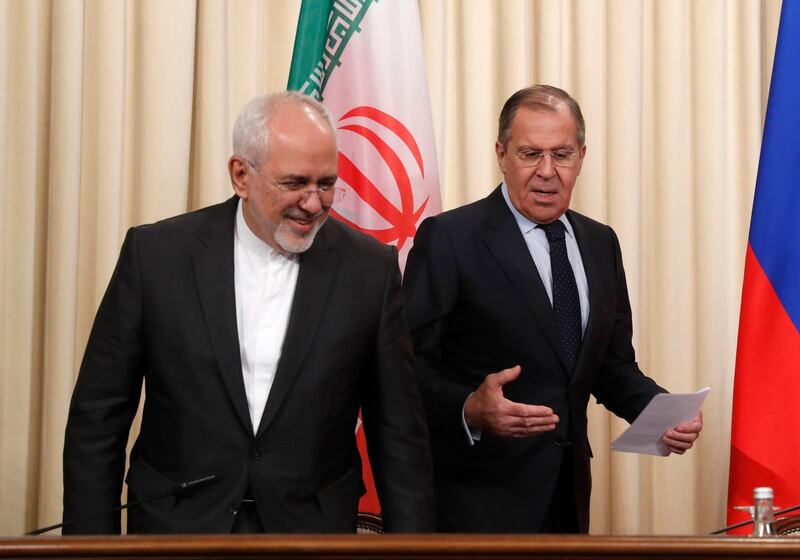Iran’s foreign minister will seek support for key European investment deals when he visits Brussels Tuesday on the final leg of a whistlestop tour to shore up support for the 2015 landmark nuclear deal.
Mohammad Javad Zarif said he was looking to see if the remaining backers of the Iran nuclear accord could “guarantee Iran’s benefits” following the decision of United States President Donald Trump to pull out of the agreement.
Mr Zarif is likely to seek assurances on European investments and the fate of a troubled 100-aircraft Airbus order following the US decision to reinstate sanctions on the Islamic Republic, said analysts.
Good and substantive meetings with counterparts in Beijing & Moscow; heading to meet with EU High Rep and E3 FMs in Brussels. Will soon determine how P4+1 can guarantee Iran’s benefits under the #JCPOA, and preserve this unique achievement of diplomacy. pic.twitter.com/qH51vd7Dby
— Javad Zarif (@JZarif) May 14, 2018
He will meet with Federica Mogherini, the EU foreign policy chief and the foreign ministers of the UK, Germany and France. The group is expected to demonstrate strong support for the accord, but the ability of the European officials to provide tangible economic benefits will be harder, said analysts.
“They will come out swinging to provide Iran with moral and psychological support and demonstrate EU defiance against president Trump’s unilateralism,” said Dr Sanam Vakil, an associate fellow at the foreign affairs think tank Chatham House. “I’m not sure how much tangible economic support they will be able to provide. It’s hard to compel private companies to do business and risk sanctions.”
The leaders of the three leading European nations had all sought to convince Mr Trump to stick to the agreement struck under the Obama administration, saying that it was the best way of preventing Iran from developing nuclear weapons.
Their failure to convince President Trump will see the US reimpose sanctions and put European businesses under pressure to wind up their links with the country.
_______________
Read more:
[ US 'lost Middle East mediating role' with embassy move, says Erdogan ]
[ Iran's Zarif in Moscow as Russia moves to save nuclear deal ]
_______________
Amid conflicting messages from the US administration, national security adviser John Bolton said that sanctions on European businesses were “possible” while secretary of state Mike Pompeo struck a more conciliatory note on Sunday, suggesting that the US and its allies could strike a new deal.
Britain’s foreign minister Boris Johnson said that he will discuss ways to protect companies doing business with Iran during the meeting with his European counterparts on Tuesday before Mr Zarif joined the talks.
“We are going to have a conversation about what we can do to help UK firms, European firms have some confidence that they can still do business,” he said.
Despite the 2015 deal loosened controls on European investment in Iran, many companies remained unable to invest because of the political uncertainty and the tighter restrictions still in place in the United States.
German companies had successfully invested by conducting its business in euros through a state-owned regional banking network without connections to the US system.
UK businesses had lagged as banks had balked at the cost of research to ensure money wasn’t being channelled to sanctioned individuals, or concerned at being left with failed investments in the event of sanctions being re-imposed.
“The banks didn’t want to be left holding the baby,” said Nigel Kushner a sanctions specialist and chief executive of British law firm W Legal. “And it’s gone exactly the way they were worried it would go.”
The extent that European trade could continue to work with non-US linked banks to invest in Iran is unclear, said Maya Lester, a British barrister and expert on sanctions legislation. “The general mood music is that it’s going to be very difficult," she said.
The accord had provided Tehran with relief from sanctions in return for curbs on its nuclear programme. Mr Trump pulled out of the accord on May 8, saying that Iran had violated the spirit of the deal by financing militant activity in the Middle East and by continuing to test ballistic missiles.
Mr Zarif wrote on Monday that he had “good and substantive meetings” with his counterparts in Russia and China as he sought to preserve what he said was a “unique achievement of diplomacy” during the first legs of his tour of key capitals.
He said that Russia had confirmed its readiness to respect the deal following a meeting with Sergei Lavrov in Moscow, and that the two countries would do everything they could to save the landmark deal.







